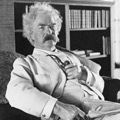Words of War and Peace with Cynthia Wachtell
Program 159 • 29 mins
CDs available via special order. HumanMedia ®
Listen to excerpt:
Program 159 • 29 mins
CDs available via special order. HumanMedia ®
Listen to excerpt:
Many great American authors have written vividly about war. But an examination of this literature, by Yeshiva University professor Cynthia Wachtell, reveals a wide variety of views by writers: some celebrate the valor of soldiers, others decry the brutality of warfare. Some writers do both, and we focus on them in this episode. You’ll hear dramatizations from Mark Twain (including his sarcastic sermon, “The War Prayer”), Walt Whitman (including a reading from ‘Drum-Taps’, a section of his famous “Leaves of Grass”) and Julia Ward Howe (who wrote “The Battle Hymn of the Republic” but later turned fervently against war—the original basis of Mother’s Day). In a world frequently still at war, we ponder these moving reflections by great writers.
 Mark Twain fascinates me, in so many ways. And, again, it fascinates me that we’re not better acquainted with his views on war. So in 1885, Mark Twain wrote a piece which was self-mocking about his experiences in the Civil War. And he elaborates and says [of a man who was killed], “The man was not in uniform, and was not armed. He was a stranger in the country. That was all we ever found out about him. The thought of him got to preying upon me every night. I could not get rid of it. I could not drive it away. The taking of an unoffending life seemed such a wanton thing, and it seemed an epitome of war. That all war must be just that: the killing of strangers against whom you feel no personal animosity. Strangers whom, in other circumstances, you would help if you found them in trouble, and who would help you if you needed it.” So we hear Mark Twain there, in his reflections upon the Civil War, offering a profound moral lesson.”
Mark Twain fascinates me, in so many ways. And, again, it fascinates me that we’re not better acquainted with his views on war. So in 1885, Mark Twain wrote a piece which was self-mocking about his experiences in the Civil War. And he elaborates and says [of a man who was killed], “The man was not in uniform, and was not armed. He was a stranger in the country. That was all we ever found out about him. The thought of him got to preying upon me every night. I could not get rid of it. I could not drive it away. The taking of an unoffending life seemed such a wanton thing, and it seemed an epitome of war. That all war must be just that: the killing of strangers against whom you feel no personal animosity. Strangers whom, in other circumstances, you would help if you found them in trouble, and who would help you if you needed it.” So we hear Mark Twain there, in his reflections upon the Civil War, offering a profound moral lesson.”
—Cynthia Wachtell, Literary historian and author of “War No More”
 The human race has only one really effective weapon and that is laughter.”
The human race has only one really effective weapon and that is laughter.”
—Mark Twain